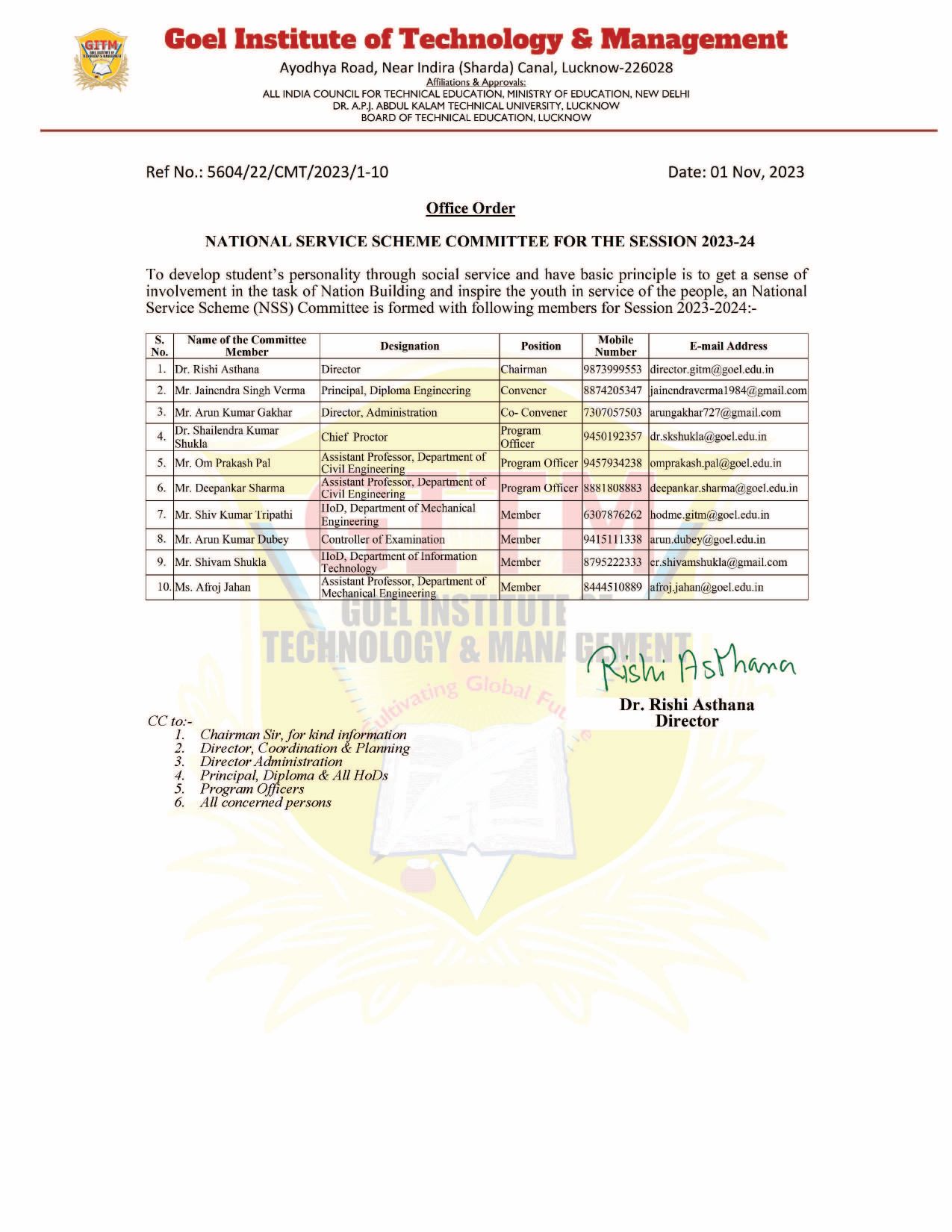The purpose of a National Service Scheme (NSS) committee in GITM is to organize and oversee the implementation of the NSS program within the college. The NSS is a voluntary public service program for students aimed at fostering social responsibility, community engagement, and personal development. The committee plays a vital role in coordinating and facilitating NSS activities.

Functions of NSS COMMITTEE:
Here are some specific purposes and responsibilities of an NSS committee in GITM:
-
Program Planning and Implementation: The committee plans and organizes various NSS activities, including community service projects, awareness campaigns, skill development workshops, and social initiatives. They identify suitable projects and initiatives that align with the NSS objectives and the needs of the local community.
-
Volunteer Engagement: The committee encourages and motivates students to participate in NSS activities as volunteers. They disseminate information about the program, recruit interested students, and coordinate volunteer registration. The committee also provides guidance and support to volunteers throughout their participation in NSS activities.
-
Collaboration with Community Organizations: The committee establishes partnerships and collaborations with local NGOs, community organizations, government agencies, and other relevant stakeholders. They identify potential service opportunities and engage in dialogue with community leaders to understand the community’s needs and priorities.
-
Training and Development: The committee organizes training sessions, workshops, and orientations to develop the skills and competencies of NSS volunteers. These may include sessions on leadership, communication, teamwork, project management, social issues, and community development. The committee ensures that volunteers have the necessary knowledge and skills to contribute effectively to NSS projects.
-
Project Monitoring and Evaluation: The committee monitors the progress and impact of NSS projects and initiatives. They assess the effectiveness of the projects in addressing community needs and achieving the desired outcomes. The committee collects feedback from volunteers, beneficiaries, and other stakeholders to evaluate the success of the initiatives and identify areas for improvement.
-
Documentation and Reporting: The committee maintains records of NSS activities, including project details, volunteer participation, and impact assessments. They prepare reports and submit them to the NSS authorities, college administration, and other relevant entities as required. The committee also facilitates the documentation of success stories, testimonials, and case studies to showcase the impact of NSS initiatives.
-
Celebration and Recognition: The committee organizes events, ceremonies, and celebrations to recognize and appreciate the efforts of NSS volunteers. They acknowledge exceptional contributions, leadership, and achievements of volunteers through awards, certificates, or appreciation letters. The committee ensures that volunteers feel valued and motivated to continue their commitment to community service.
-
Awareness and Promotion: The committee promotes awareness of social issues, community development, and civic responsibility among students and the wider college community. They organize awareness campaigns, guest lectures, seminars, and workshops on relevant topics to educate and sensitize students about social challenges and the role they can play in addressing them.
The NSS committee in an engineering and management college serves as a catalyst for social change and community development. By coordinating NSS activities, engaging volunteers, and fostering collaboration with community organizations, the committee helps students develop a sense of social responsibility, empathy, and leadership skills. The NSS program enables students to actively contribute to society while gaining valuable experiences and personal growth.
Frequency of Meeting:
The NSS Committee meets quarterly in an academic session and can schedule meetings in between as per the requirement.
Attendance at the meeting:
Around 80 to 90 Percent of committee members are always present in the meeting
